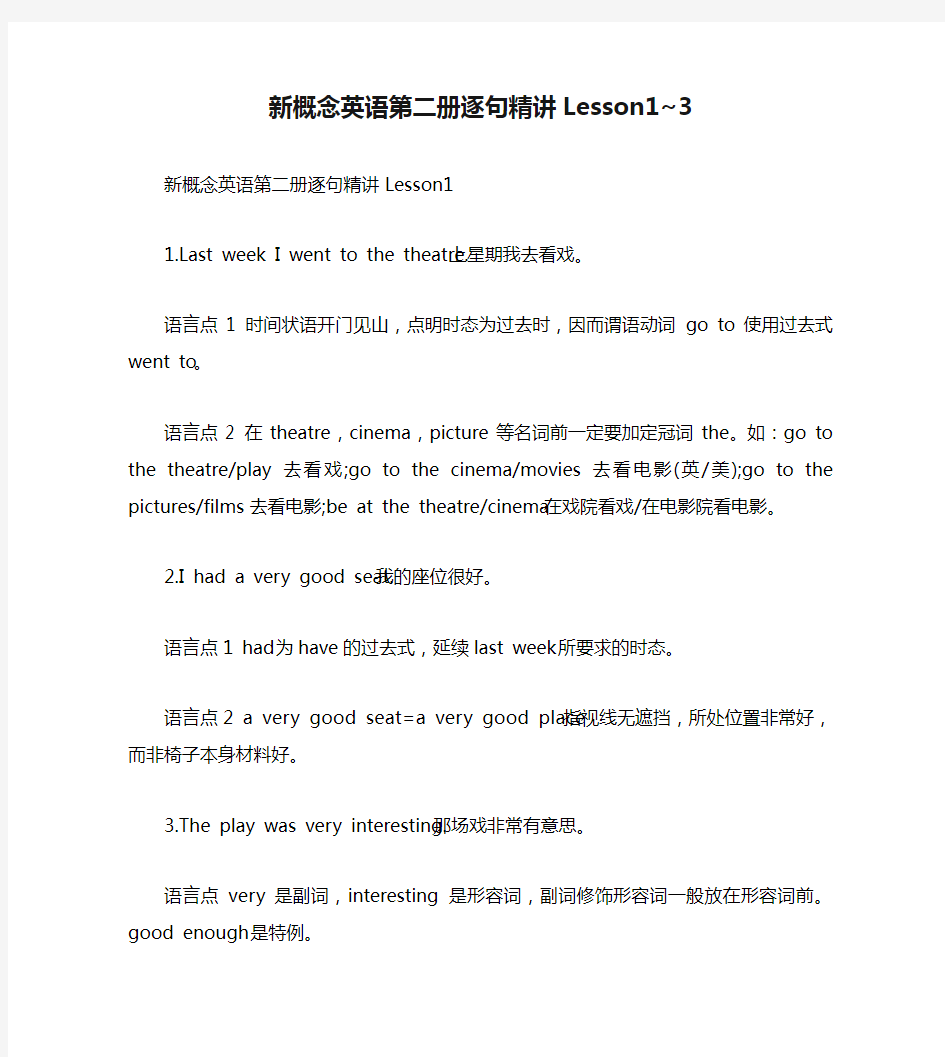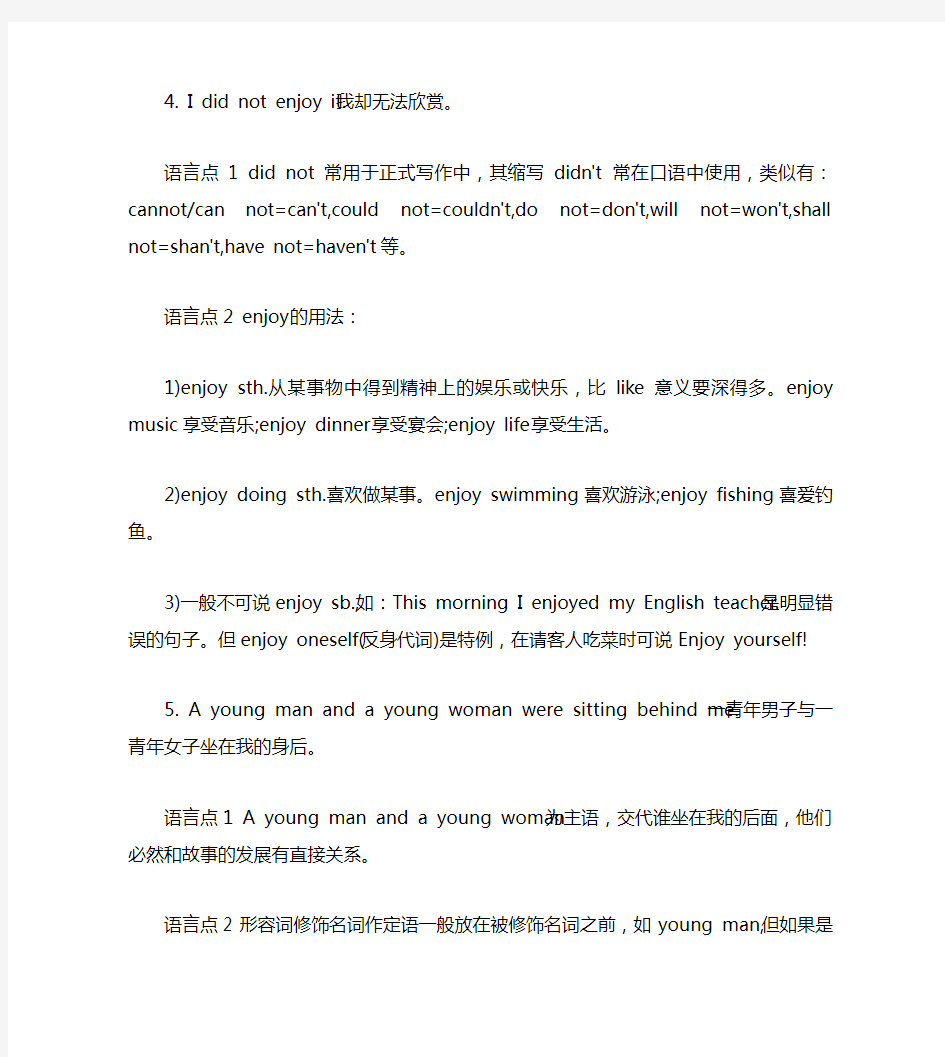

新概念英语第二册逐句精讲Lesson1~3
新概念英语第二册逐句精讲Lesson1
https://www.doczj.com/doc/7f2892847.html,st week I went to the theatre.上星期我去看戏。
语言点1 时间状语开门见山,点明时态为过去时,因而谓语动词
go to使用过去式went to。
语言点2 在theatre,cinema,picture等名词前一定要加定冠词the。如:go to the theatre/play去看戏;go to the cinema/movies 去看电影(英/美);go to the pictures/films去看电影;be at the theatre/cinema在戏院看戏/在电影院看电影。
2.I had a very good seat.我的座位很好。
语言点1 had为have的过去式,延续last week所要求的时态。
语言点2 a very good seat=a very good place指视线无遮挡,
所处位置非常好,而非椅子本身材料好。
3.The play was very interesting.那场戏非常有意思。
语言点 very是副词,interesting是形容词,副词修饰形容词一
般放在形容词前。good enough是特例。
4. I did not enjoy it. 我却无法欣赏。
语言点1 did not常用于正式写作中,其缩写didn't常在口语中
使用,类似有:cannot/can not=can't,could not=couldn't,do
not=don't,will not=won't,shall not=shan't,have not=haven't等。
语言点2 enjoy的用法:
1)enjoy sth.从某事物中得到精神上的娱乐或快乐,比like意义要深得多。enjoy music享受音乐;enjoy dinner享受宴会;enjoy
life享受生活。
2)enjoy doing sth.喜欢做某事。enjoy swimming喜欢游
泳;enjoy fishing喜爱钓鱼。
3)一般不可说enjoy sb.,如:This morning I enjoyed my English teacher.是明显错误的句子。但enjoy oneself(反身代词)是特例,在请客人吃菜时可说Enjoy yourself!
5. A young man and a young woman were sitting behind me. 一青年男子与一青年女子坐在我的身后。
语言点1 A young man and a young woman为主语,交代谁坐在我的后面,他们必然和故事的发展有直接关系。
语言点2 形容词修饰名词作定语一般放在被修饰名词之前,如young man,但如果是介词短语形容词短语作定语或修饰名词的定语则放在被修饰名词之后。例:a man in the room(介词短语)在房间里的一个男人。Is it a problem difficult to solve(形容词短语)?这是个难解决的问题吗?
语言点3 本句时态:were sitting为过去实行时,与sat(一般过去时)不同语言点4 behind反义词:in front of。原句可改写为I was sitting in front of them.
6. They were talking loudly. 他们俩在一直在那里大声地交谈着。
语言点1 were talking为谓语动词部分,loudly是副词,副词一般修饰动词放在其后。例:hit hard重重地打;speak slowly慢条斯理地说;touch softly温柔地抚摸
语言点2 were talking过去实行时,为何不用"They talked loudly."呢?因为be doing是介绍背景时的选择能够起到增强印象的
效果。
比较:I speak English.我讲英语。/I am speak English now.
我现在正在讲英语。
7. I got very angry. 我很生气。
语言点比较I was very angry.我那时很生气。/I got very angry.我变得很生气。用get表示“变得”,强调变化的过程。get在作“变得”讲时常后接形容词,如got old变老;got hot变热;got hungry感到饥饿;均有肩井的意味。
8.I could not hear the actors.我听不到演员们在说什么。
语言点 hear 听到。例如:can you hear the signal?你能听到
信号吗?listen to 听,如:Don't listen to him.不要听他的话。
9.I turned round.我转过身去。
语言点1 turn 转过;round 围绕着,在周围。turn 的相关短语有:turn round 转身;turn left 向左转;turn right 向右转;turn over
翻身
语言点2 turn round 英式英语;turn around 美式英语
10.I look at the man and the woman angrily.
我生气的看着那一对男女。
语言点辨析:see,watch,look,look at
1)see 看见(结果):please see who is knocking.去看看谁在敲门。
2)watch 观看(动态):He is watching the crowd go by.他注视
着人群走过。
3)look 看(动作):look,look!快看,快看!
4)look at 看着(持续动作,后接宾语):please look at my fingers.请看看我的手指。
11.They did not pay any attention.
他们却毫不理会。
语言点1 想要表达注意的水准只需在attention前加形容词即可:
pay no attention 不注意;pay a little attention 稍加注
意;pay more attention to 更加注意;pay great attention to 非常
注意;pay close attention to=focus on/stare at 注重;盯着。例如:The police paid close attention to the thieves.警察盯着小偷的
一举一动。
语言点2 any一般用在否定句中,not pay any attention 意思为:根本就不注意。此处not pay any attention后无介词to,补充
完整应该为:They did not pay any attention to me.
12.In the end, I could not bear it.
最后,我实在是忍无可忍了。
语言点 in the end,at last,finally.in the end 经过一系列的
变化之后最终某事才发生;at last 经过克服困难,最终达到某种目
的;finally按照一定的顺序实行到最后。
13.I turned round again. 'I can't hear a word!' I said angrily.
我再次转过身来,生气的说:“我一个字都听不见了!”
语言点1 口语中经常会用:Can I have a word with you?=May I talk with you.
语言点2 常用谚语:Actions speak louder than words.行胜于言。
14.'It's none of your business, ' the young man said rudely. 'This is a private conversation!'
“这不关你的事情”那个男人说:“这是我们私人间的谈话。”
语言点:none of one's business 意思为“不管某人的事情”,
此话较为不礼貌,应慎用。
新概念英语第二册逐句精讲Lesson2
1、It was Sunday. I never get up early on Sundays.
那是个星期天,我星期天从不早起的。
语言点1 never表示无条件的没有,意思相当于not,但两个词在用法上有区别:never后常接动词,而not表否定时前面一般需加助动词do,have等。
语言点2 never属于频率副词。
She never said a word the whole two hours.整整两个小时她
一句话也没说。
语言点3 get up=rise(rose过去式, risen过去分词)起床
I rose at 6 o'clock this morning.今天早上我是6点钟起床的。
语言点4 get up early起得早;early bird早起者,早到的人
The early bird catches the worm.早起的鸟儿有虫吃。
语言点5 on Sundays, 请注意复数结尾,表示每逢星期天。
2、I sometimes stay in bed until lunchtime.
有时候我一直赖床到午饭时间。
语言点1 关于“有时”的表达:sometimes=at
times=occasionally=now and then
语言点2 关于“睡觉”的表达:stay in bed躺在床上;stay
up=be up醒着;insomnia失眠
语言点3 breakfast早餐;lunch午餐;dinner正餐(多为晚
餐);supper(晚餐);snack原指小吃,可指夜宵,注意与snake“蛇”
区分;meal广义上的“餐”,没有时间限制。
3、Last Sunday I got up very late.
上周日我起得很晚。
语言点1 Last Sunday为前置时间状语,也能够放于句尾。变化
如下:I got up very late last Sunday.但时间状语前置更强调时间。
语言点2 比较学习:
1)late迟的,晚的:The airplane was late.飞机晚点了。
2)lately=recently最近,近来:Have you been there lately?
近来你去过那里吗?
3)latest最新的:the latest news最新消息;the latest style
最近款式
4、I looked out of the window.
我向窗外望去。
语言点 look相关短语:
1)look out of向外看(后常接门、窗等)
2)look out=be careful当心,小心:Look out! There is a danger ahead.当心!前面危险。
3)look up仰视:My boss looked up as I entered the office.我进办公室时,老板抬头看了看。
4)look after照顾,照料:My friend looked after my cat while I was on holiday.在我去度假的时候,朋友照料我的猫。
5)look on旁观;合看:May I look on with you?我能够跟你合看这本书吗?
5、It was dark outside.
窗外一片黑暗。
语言点如表示天正逐步变黑,则用实行时态:It is getting dark outside.夜幕降临了。
6、"What a day!" I thought.
“多么糟糕的天气啊!”我想。
语言点 what引导的感叹句表示惊讶、愤怒、赞赏、喜悦等感情,具体的含义要根据说话者的语气或上下文的意思而定。
what(+a/an)+形容词+名词+主语+谓语!(当名词为复数或不可数时省去不定冠词)
What a good job he has done! 他干得太棒了!
What an interesting play it is!多么有趣的一部戏啊!
What a nice dog it is!多可爱的狗啊!
在口语中经常对名词实行感叹,以此名词结尾。
例:What a day!语气为降调表示感叹“天气坏”,语气为升调表示感叹“天气好”。
注意:a/an后必须接可数名词单数。
7、"It's raining again."
又下雨了。
语言点表达下雨、下雪、踢球、读书等动作多用实行时态。
It is snowing in great flakes. 正值大雪纷飞。
We are playing football on the street. 我们在街上踢球。
I am reading a letter now. 我正在第一封信。
8、Just then, the telephone rang.
就在那时,电话响了。
语言点 just then=just at that time/moment 就在那时
9、It was my aunt Lucy.
是我姑姑露西打来的。
语言点表亲友关系时,能够用“称谓+人名”,但如果是身份或职位时不能够这样表达,如“张老师”不能说成Teacher Zhang.
10、"I've just arrived by train," she said. "I'm coming to see you."
“我刚下火车,”她说,“我就要来看你了。”
语言点1 “by+交通工具”表示“乘坐……”:by air/by airplane乘飞机;by boat/ship乘船;by bike骑自行车;by bus乘公交车;by car乘小汽车;by train乘火车
但表达“步行”时,不可说by foot, 应为on foot.
语言点2 瞬间性动词用于实行时态时表示即将开始的动作。
这些词主要有:come来;leave离开;arrive到达;land着陆;meet 见到;die死;start开始;retur返回;join加入
He is leaving。他就要准备走了。
We are starting。我们准备开始了。
Most young people will be meeting the pop singers at the airport。绝大部分年轻人即将在机场迎接这些流行歌手。
11、"But I'm still having breakfast," I said.
“但是我还在吃早餐呢,”我回答道。
语言点 still意为“仍然,还在”,在句子中起强调作用。
Today the best jobs are still given to men.现在的工作还是给了男人。
He came yesterday and he is still here.他昨天来的,现在仍在这里。
12、"What are you doing?"she asked.
“你在干吗呢?”她问道。
语言点 doing表示正在做某事,前句用having,此句用doing,问答一致。
此句意思可随语调改变,声调表示疑问,降调则转变为责怪。
13、"I'm having breakfast," I repeated.
“我正在吃早饭。”我重复了刚才的话。
语言点1 总结关于“吃喝”的表达:
1)have一词多义,应用最为灵活:have breakfast吃早餐;have supper吃晚餐;have snack吃夜宵
2)eat后常接干或较浓的食物:eat soup喝汤(西餐的汤较浓,不可说成drink soup);eat porridge喝粥;eat sandwich吃三明治;eat hamburger吃汉堡包
3)drink后常接较稀的饮品:drink tea喝茶;drink wine喝
酒;drink cola喝可乐
4)“吃药”不能用eat或drink,而用take:take medicine吃药
5)宝宝吃奶,不能用eat或drink,而用suck:My baby is sucking the milk.我的宝宝正在吃奶。
语言点2 repeat=say sth. again重复。切记repeat sth. again 是错误的。
14、"Dear me," she said.
“我的老天爷啊!”她惊呼道。
语言点1 dear在英语中常为称呼语,如:dear father, dear Bill, dear friend等。它并非爱人之间的专用词,真正的爱人之间常用darling,尤其在抒情歌曲中更多。在情书中经常采用的称呼是My dearest...,我最最最亲爱的……
语言点2 表达“天啊”英美式英语之间的不同:
英式英语:My dear!或Dear me!(英国人比较有绅士风度)
美式英语:My God!(首字母大写)或My gosh!(美国人表达得则比较夸张、豪放)
15、"Do you always get up so late? It's one o'clock!"
“你总是起得这么晚吗?已经是下午一点钟啦!”
语言点 1 注意:英语中多用单引号,且单引号与双引号作用相同,使用时需保持一致,即第一重引语用单引号时,当中引述都用双引号,第一重引语用双引号时,当中引述都用单引号。
语言点2 英语中常用的标点符号:comma逗号;period句号;colon 冒号;semicolon分号;dash破折号;dots省略号;slash斜线
号;parentheses圆括号;brackets方括号;apostrophe撇号;question mark问号;quotation marks引号;exclamation mark叹号。
新概念英语第二册逐句精讲Lesson3
1.Postcards always spoil my holidays.
明信片总是搅得我假日不得安宁。
语言点1 always为频率副词,注意它位于实义动词spoil之前。
always与ever用法辨析:
1)always和ever两个词的含义比较接近。always的含义是“总是”(=at all times/all the time)。
However,this does not always happen.不过,这种情况并不总
是发生。
2)ever的含义是“不管在什么时候”(=at any time),多用于疑
问句和条件句中。
Have you ever been to Beijing New Oriental School?你去过
北京新东方学校吗?
3)forever或for ever意为“直到任何时候,永远”。
I shall remember New Concept Engishforever.我会永远记住
《新概念英语》的。
语言点2 holidays(英式)=vacations(美式):表示一个假期有很多天,常以复数形式出现。
https://www.doczj.com/doc/7f2892847.html,st summer, I went to Italy.
去年夏天,我去了意大利。
语言点1 last summer为过去时间状语,谓语动词用went,满足时间状语和时态一致的原则。
语言点2 表达时间的单词:
1)月份,首字母大写;
2)星期,首字母大写;
3)季节,一般首字母小写。
语言点3 Italy(意大利)重读在第一音节,Italian(意大利语,意大利人)重读在第二音节。
3.I visited museums and sat in public gardens.
我参观了博物馆,还在公园里小憩。
语言点1 and连接两个句子,形成并列句,要注意时态一致。
I ate an apple and drank a cup of cola.我吃了个苹果,喝了杯可乐。
语言点2 扩展学习
1)public garden公园;private garden私家花园;public elementary school公立小学;public secondary school公立中
学;private elementary school私立小学
2)the public公众;populace平民,大众,老百姓;population人口
以上就是小编为自学新概念英语的同学们带来的逐句精讲新概念2:第三课请给我寄一张明信片的全部内容,更多相关内容尽在新东方在
线新概念英语网!
4.A friendly waiter taught me a few words of Italian.
一位好客的服务员教了我几句意大利语。
语言点1 a few几个,修饰可数名词。a little一点点,修饰不
可数名词,还能够表述为a little bit, a bit, somewhat.
I am somewhat tired of this work.我对这个工作有点厌烦了。
语言点2 原句还可表达为:A friendly waiter taught me a
little Italian.
5.Then he lent me a book.
然后,他借给了我一本书。
语言点双宾语应用:lend sb, sth.=lend sth. to sb.借给某人
某物/把某物借给某人
Then he lent me a book.=Then he lent a book to me.
I showed my mother(间接宾语)this wonderful picture(直接宾语).
=I showed this wonderful picture(直接宾语)to my mother(间
接宾语).
我给母亲看了这张漂亮的照片。
6.I read a few lines, but I did not understand a word.
我读了几行,但一个单词都不理解。
语言点1 read译为“阅读,攻读,学习;看懂;辨认,察觉”
read a riddle猜出谜语;read malice in sb's face从某人脸上
看出恶意
How do you read the sentence?你怎么理解这句话?
My brother reads the news lately.我弟弟最近才知道这个消息。
语言点2 understand意为“懂,理解”,近义词有:comprehend, grasp, know, realize
语言点3 understand的反义词有:misunderstand,
misinterpret
7.Everyday I thought about postcards.
假期里的每一天,我都在考虑明信片的事。
语言点 think about考虑,think为不及物动词,后不可直接加
宾语。
用法:think of/about sth.=concern/consider sth.考虑某事,
记着某事
We are thinking of learning New Concept English Book Three.
We concern about learning New Concept English Book Three.
8.My holidays passed quickly, but I did not send cards to my friends.
我的假期过的飞快,但是我并没有给我的朋友们寄明信片。
语言点 Time passed quickly/slowly.时间过得真快/慢!
How time fles!(口语)光阴似箭!
time after time(=again and again)一次又一次地
9.On the last day I made a big decision.
在最后一天我作出了一项重大的决定。
语言点1 "on the last+时间名词"表示具体的时间点,意为“最后的……”
last的两个常用的意思:
1)上一个:last summer上个夏天;last year去年;last week上周
2)最后的(=final):I'm the last one.我是最后一个。
语言点2 make a big decision作出一项重大决定(decide为名词)
decide to do sth.决定去做某事(decide为动词)
make up one's mind下定决心(动词短语)
10.I got up early and bought thirty-seven cards.
我起得很早并且去买了37张明信片。
get up early/late起得早(晚);get up a party筹备一个舞
会;get up a subject研究一门学科;get up speed加快速度
11.I spent the whole day in my room, but I did not write
a single card!
我在自己的房间里关了一整天,但是连一张明信片都没有写!
语言点1 "sb. spend+时间+地点"意为“某人在某地度过了多长时间”
My father spent two weeks in Beijing.我爸爸在北京待了两个星期。
语言点2 the whole day=all day整天
语言点3 in one's room在某人的房间里;in one's house在某人的房子里;at one's house在某人的家中